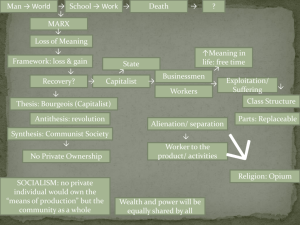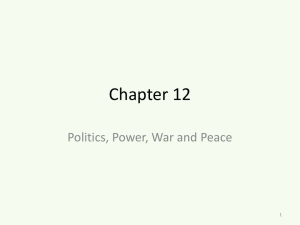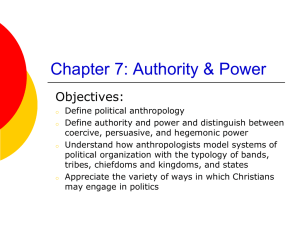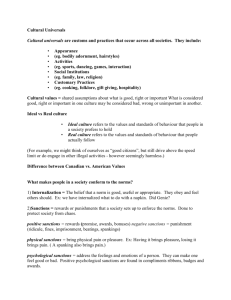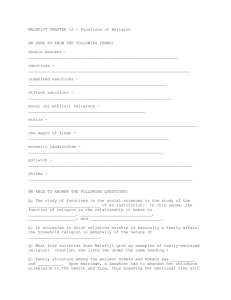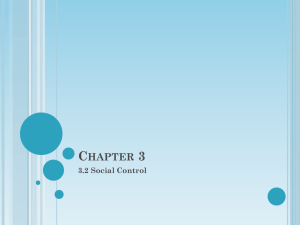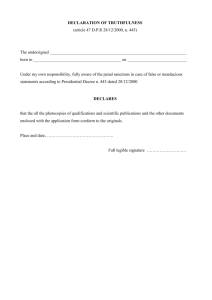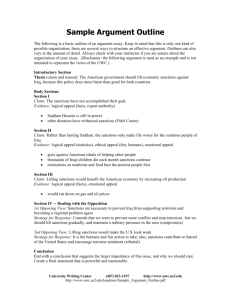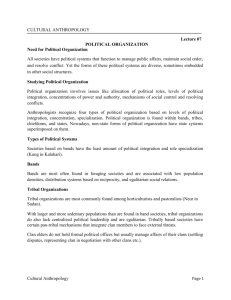Political System Band Societies
advertisement
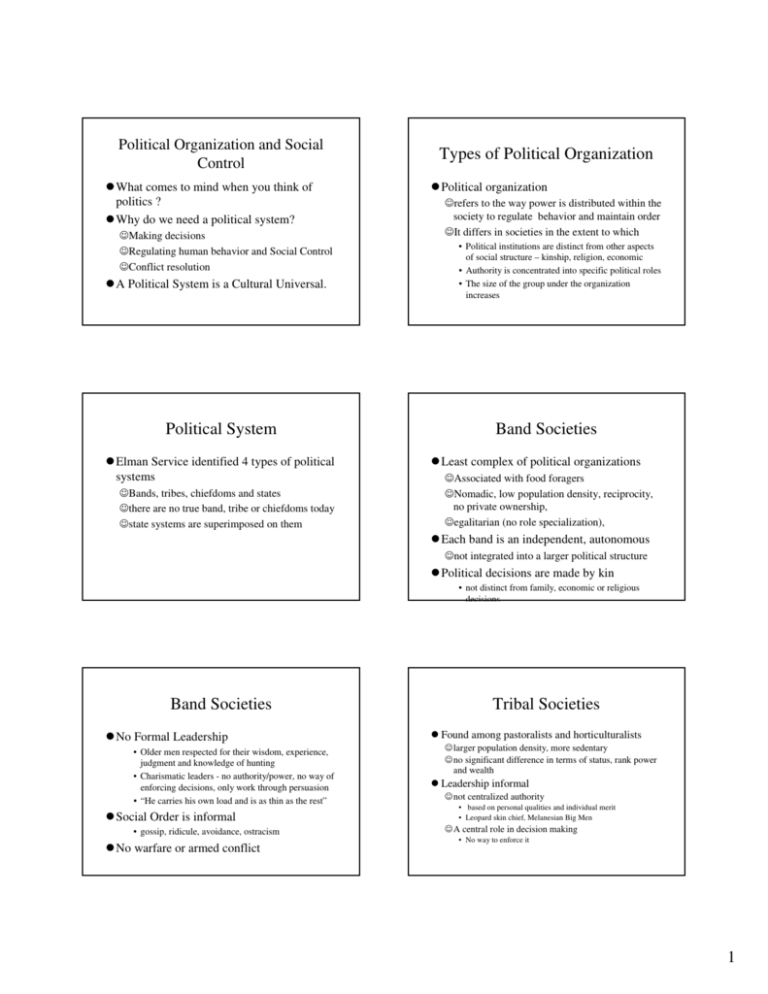
Political Organization and Social Control What comes to mind when you think of politics ? Why do we need a political system? ☺Making decisions ☺Regulating human behavior and Social Control ☺Conflict resolution A Political System is a Cultural Universal. Political System Elman Service identified 4 types of political systems ☺Bands, tribes, chiefdoms and states ☺there are no true band, tribe or chiefdoms today ☺state systems are superimposed on them Types of Political Organization Political organization ☺refers to the way power is distributed within the society to regulate behavior and maintain order ☺It differs in societies in the extent to which • Political institutions are distinct from other aspects of social structure – kinship, religion, economic • Authority is concentrated into specific political roles • The size of the group under the organization increases Band Societies Least complex of political organizations ☺Associated with food foragers ☺Nomadic, low population density, reciprocity, no private ownership, ☺egalitarian (no role specialization), Each band is an independent, autonomous ☺not integrated into a larger political structure Political decisions are made by kin • not distinct from family, economic or religious decisions Band Societies No Formal Leadership • Older men respected for their wisdom, experience, judgment and knowledge of hunting • Charismatic leaders - no authority/power, no way of enforcing decisions, only work through persuasion • “He carries his own load and is as thin as the rest” Social Order is informal • gossip, ridicule, avoidance, ostracism No warfare or armed conflict Tribal Societies Found among pastoralists and horticulturalists ☺larger population density, more sedentary ☺no significant difference in terms of status, rank power and wealth Leadership informal ☺not centralized authority • based on personal qualities and individual merit • Leopard skin chief, Melanesian Big Men ☺A central role in decision making • No way to enforce it 1 Tribal Societies Tribes are independent political units ☺but unlike bands could be integrated into a larger units for collective action • threat for attack or opportunity to attack ☺Integrating forces or Pan tribal mechanisms • Clans , segmentary lineage system (kin based) • age grades and secret societies (nonkin based) • Integrating forces not permanent – Dissolve when threat is eliminated In Short… In bands and tribes ☺Local groups are economically and politically autonomous ☺Authority is uncentralized ☺Population tends to be egalitarian, roles unspecialized, population small Social Control ☺informal ways of controlling deviant behavior Chiefdoms Arose with growing surpluses and larger populations ☺Society is stratified - ranked • Nobles, commoners (different levels of prestige and power) ☺centralized leadership • chiefship is hereditary • Sometimes there are several political units each headed by a chief • Basseri (Khan), Bedouin (Sheikh), Fijian (chief) State System Most formal and complex form of political units ☺including many communities and thousands of people ☺First appeared 5500 years ago with civilizations ☺Found in societies with • complex socioeconomic characteristics • Supported by intensive agriculture, labor specializations Centralized government ☺power and authority to draft men for work or war ☺make and enforce regulatory laws ☺collect taxes Chiefdoms Function of the chief • • • • collection, storage and distribution of goods supervise religious festivals plan and direct use of public labor regulation of behavior and conflict resolution British created chiefs in Nigeria, Kenya, Australia, Hawaii during colonial rule ☺Given salaries, high sounding titles “Paramount chief” but no popularity among their people. State System Complex political structure ☺with a wide range of permanent institutions having legislative, executive and judicial functions and large bureaucracy ☺Large number of specialized political roles Well established boundaries ☺people enjoy rights and citizenship Extend territories • by encroaching on boundaries of neighboring bands, tribes, chiefdoms or less powerful states 2 Rise of States Voluntaristic theory of state formation ☺V. Gordon Childe Hydraulic theory of state formation ☺Karl Wittfogel Coercive theory of state formation ☺Robert Carneiro How is Social Order enforced? Encouraging and rewarding conformity with norms and laws and discouraging and punishing nonconformity/deviance Use of Sanctions ☺A sanction is a reaction by the society to approved and disapproved behavior • Approved behavior receives positive reaction • Disapproved behavior receives negative reaction Sanctions - Organized Organized positive sanctions include formal gestures of approval ☺Awards, titles, military/civilian decorations.. Organized negative sanctions are formal punishments ☺Prison, death penalty…. ☺Breaking the law • Laws are formalized social norms whose infarction faces strong reaction/penalty Social Order and Dispute Resolution Every society has defined what is normal, proper or expected way of behaving ☺These expectations are social norms • examples • Provide behavioral guidelines ☺Violation of social norms is called deviance ☺If people do not conform to group rules it results in …… • Tension, dissatisfaction, disputes & social destability • Therefore crucial to regulate behavior, settle disputes and maintain order Sanctions - Diffused Formal/ Informal or Diffused/organized Diffused positive sanctions are informal gestures of approval ☺Thank you notes, applause…. Diffused negative sanctions are informal punishments ☺Criticisms, avoidance, ridicule, sarcasm, gossip Diffused sanctions are very powerful Externalized and Internalized Sanctions are effective deterrents to antisocial behavior ☺Externalized system of Control Social control may also be internalized ☺“built into individuals” ☺During socialization ☺Fear of supernatural punishment ☺Witchcraft 3 Dispute Resolution Sanctions though effective are never 100% guaranteed ☺ Disputes arise and have to be resolved Formalized and Centralized judicial system Negotiation Mediation Adjudication Arbritation Informal courts – whole community Determination of Innocence and Guilt Judge, jury, courts… Divination ☺Crystal ball, willow witching Conditional curse or oath Ordeals ☺ Song dueling , an analogy in American music… ☺ spear throwing 4
